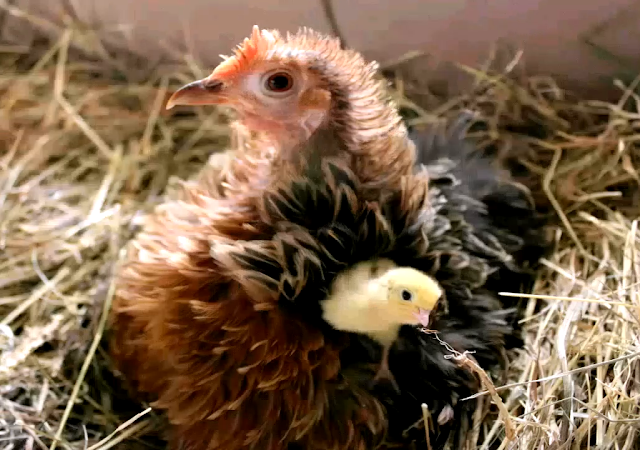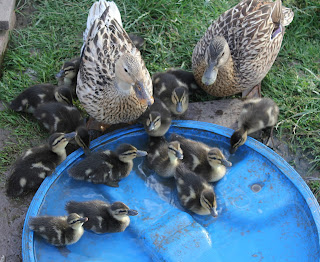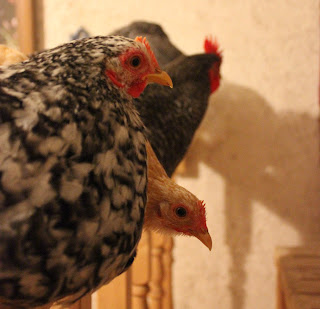I started raising quail with bantam hens in 2005, I used the hens I had to hand, which were Ardenners and later I used Sebright crosses. These hens were excellent, quick and clever, they adapted to raising quail as if they saw no difference. However it was when I started with Cochin bantams and the way they kept the quail with them for so long; over 3 months and taught them so much, including I believe how to become mothers and fathers themselves that got us to the next stage with Coturnix. For, it was directly after using Cochin Pekin bantams that the quail started to go broody, sit eggs and hatch chicks. Maybe I'd finally got the environment right with my mini quail food forest but I believe it was a lot down to 'Cappuccino's' intuitive bonding ability (see below).
I ask a lot of my birds but that is because they have always given me so much. There is never anything I have asked them to do in the way of bringing up chicks or hatching eggs that I have done without a backup plan. I believe that sitting eggs is such a tedious task, given that hens can't read, that it would be immeasurably cruel to expect them to sit for 19 to 24 days for no permanent result. The worst crime would be for me to expect a hen to hatch eggs and then have those babies taken away and for her to be left with nothing. One of my most viewed films on YouTube is 'Duckling Disaster Hatch' and I have to admit that I chose the title due to schadenfreude being sadly such a great draw. The fact, however that the whole episode didn't descend into the chaos inherent in its makeup was due solely to the care and adaptability of my Cochin Pekin bantam Pearl.
Cochins/Pekin Bantams Make Excellent Quail Mothers
Although, as already explained, I have used several breeds of heritage hens and heritage crosses to raise chicks Cochin Frizzles (including Cochin Frizzle crosses) are one of my favourite choices. This is because Cochin Frizzles have the physical warmth of heavy plumage but with the added advantage of the open nature of the individual frizzled feather which allows the quail chicks their natural propensity to burrow down near to the skin. Furthermore and most importantly, without getting tangled and potentially dangerously caught up around the neck. I only found out why the quail chicks have a natural inclination to secure themselves in the feathers once my quail hatched their own eggs. My mother quail carry the chicks to a new food source and when she arrives, she actually shakes them out of her feathers. When a hen similarly gets up after brooding the quail, these latter can end up actually hanging by the neck because the whole length of the feather has wound around them. This creates a dangerous situation on two counts, not only because the chicks can strangle themselves but also if the hen moves she may, not knowing what is attached to her, kick out and harm the chick.
Cappuccino was with her quail for over 3 months, which gave her so much time with them and for them in turn to appreciate what it was to have a mother.
Frizzled
birds in my experience have great authority within the flock; and a decisiveness, which makes them imminently suitable to raise quail. They are also determined, when once given a task, to see it through. Cappuccino went on not only to look after her own quail chicks until they were old and well into adulthood but also to aid in getting my quail chicks to accept my purchased adult quail and make them into one harmonious flock.
Cochins Hatching Ducklings
Both Cappuccino and Pearl did an excellent job of hatching quail and ducklings respectively. Pearl was totally devoted to her ducklings and if circumstances had been different, would have no doubt raised them to perfection.
The two she hatched were almost a week younger than the rest, so we kept them longer. I even had given them a little water feature and this did not phase Pearl at all. I'm not sure how she would have acted to them going into a pool or pond but as I'm hoping in the future to get duck hatching eggs it will be an interesting exercise. I know friends have said their hens panicked the first time this happened but again I think all hens are individuals, so they can react in different ways. I was also so happy that she took to the baby pigeon after the ducklings had been reunited with their confused biological mother(s)!
The two she hatched were almost a week younger than the rest, so we kept them longer. I even had given them a little water feature and this did not phase Pearl at all. I'm not sure how she would have acted to them going into a pool or pond but as I'm hoping in the future to get duck hatching eggs it will be an interesting exercise. I know friends have said their hens panicked the first time this happened but again I think all hens are individuals, so they can react in different ways. I was also so happy that she took to the baby pigeon after the ducklings had been reunited with their confused biological mother(s)!
What to do when a duck deserts on day of hatch
One of the unwritten rules of reciprocal homesteading is that animals or
birds always choose the time you are away to have a crisis! read more
As Bertie Wooster put it in Right Ho, Jeeves:
'I've said it before, and I'll say it again--girls are rummy. Old Pop Kipling never said a truer word than when he made that crack about the f. of the s. being more d. than the m.'
However, I must say I've never seen my Cochin hens fight! Cochin crosses however, do, witness Mrs Butter-wouldn't-melt-in-her-mouth above.
Convinced about Cochins? I hope so.
Caring Cochins
One
of the most amazing examples of how caring hens can be happened two years ago in early Autumn/Fall, when one of my young Cochin hens (Snow Kitten), who had recently gone broody adopted some of the chicks from a large group. These included some with very fine feathering due to Sebright blood and thus particularly vulnerable to cold and wet weather.
Normally we have an Indian Summer at this time of year, here on the Western coast of France and the temperatures can rise as high and sometimes even higher, than in Summer. Canny tourists take their holidays late in the year here to benefit from the emptier beaches and lower prices. I guess over the years my hens have got used to late hatching but with a large group of chicks, some of whom are susceptible to cold, they can end up with some of the chicks trailing around the garden or sitting huddled together in a small pool of fickle sunlight. For the full story of Snow Kitten and her amazing ability not only to adopt chicks but to actively seek out those that need help, I'll refer you to the whole article below.
Normally we have an Indian Summer at this time of year, here on the Western coast of France and the temperatures can rise as high and sometimes even higher, than in Summer. Canny tourists take their holidays late in the year here to benefit from the emptier beaches and lower prices. I guess over the years my hens have got used to late hatching but with a large group of chicks, some of whom are susceptible to cold, they can end up with some of the chicks trailing around the garden or sitting huddled together in a small pool of fickle sunlight. For the full story of Snow Kitten and her amazing ability not only to adopt chicks but to actively seek out those that need help, I'll refer you to the whole article below.
 Broody adopts chicks in cold weather.
Broody adopts chicks in cold weather.
Some times people comment in surprise on my films that a hen will raise
anything but her own eggs but this is only half the story...read more
Familiy Ties and Filial Bonds
Cochins
in my experience are very loyal once they form bonds with other birds,
as I found recently when looking through my image files. Our Cochin
'Millefeuilles' has been pair-bonded to 'Spike' our black-laced golden
Polish Frizzle for five years, Polish in my experience are similarly
prone to monogamy. When Millefeuilles and her friend, a Cochin cross,
decided to go broody and sit an egg, they quite happily formed a ménage à trois and all looked after the chick (note her sleeping under her Dad)!
As
witnessed from the images above and left, two whole families of Cochins
I hatched here have always foraged and remained together in the garden.
My two mottled Cochin brothers 'Big Cuckoo' and 'Hastings' were
inseparable as chicks and juveniles and then followed the usual
semi-wild behaviour that a forest garden seems to engender. Unfortunately
this can have a downside as in my experience brothers are always
attracted by the same hen and then they will fight bitterly over and for
her.
I am happy to say that after this initial
skirmish, things did calm down and due to the essential oils, good food
and a great big hug both Hastings and his brother made a full and speedy
recovery.
These are the only real contact fights I
have ever had in this garden, brothers fighting over the same partner,
it has happened with three Ardenner brothers and two Sebright brothers.
A year after the Hastings episode it also happened again with another set of Cochin brothers and again over a single hen.
Other
conflicts that involve males in this garden are purely non-contact and
ritualistic. In fact the hens are much more violent and physical.
As Bertie Wooster put it in Right Ho, Jeeves:
'I've said it before, and I'll say it again--girls are rummy. Old Pop Kipling never said a truer word than when he made that crack about the f. of the s. being more d. than the m.'
However, I must say I've never seen my Cochin hens fight! Cochin crosses however, do, witness Mrs Butter-wouldn't-melt-in-her-mouth above.
Convinced about Cochins? I hope so.
Thanks for dropping by and do feel free to share experiences or ask for further information in the comment section. If you have enjoyed this piece and found it
useful think about sharing it with your family and friends, on social media and also maybe about joining this blog
and/or subscribing to my Youtube channel or even supporting us on
Patreon or
It all helps to keep me going!
Until next time, all the very best from Normandie! Sue
© 2018 Sue Cross
RELATED ARTICLES
Choosing Chickens Pt 1 - Cochin Pekin
The Cochin like all ancient breeds are excellent foragers and quickly
become a vital part of any garden, keeping down weeds and pests. And as
not all of the Cochin Craze story was 'spin',..read more
 The Cochin Craze - A Story of Addiction
The Cochin Craze - A Story of Addiction
These fluffy bundles, which I have been raising
for ten years have a unique and fascinatingly terrible history,
involving bloody wars, tea, silver and above all opium. A three part
article on the chicken version of Tulip Mania and my own Cochin..read more
 The Cochin Craze 2. From Craze to Mania
The Cochin Craze 2. From Craze to Mania
'The
introduction of these fowls...was a memorable event in the history of
poultry; since they undoubtedly awakened a startling "mania" which was,
calmly considered, one of the most curious phenomena of the nineteenth
century'...read more
 The Cochin Craze - A Story of Addiction
The Cochin Craze - A Story of Addiction
These fluffy bundles, which I have been raising
for ten years have a unique and fascinatingly terrible history,
involving bloody wars, tea, silver and above all opium. A three part
article on the chicken version of Tulip Mania and my own Cochin..read more
 The Cochin Craze 2. From Craze to Mania
The Cochin Craze 2. From Craze to Mania
'The
introduction of these fowls...was a memorable event in the history of
poultry; since they undoubtedly awakened a startling "mania" which was,
calmly considered, one of the most curious phenomena of the nineteenth
century'...read more

















